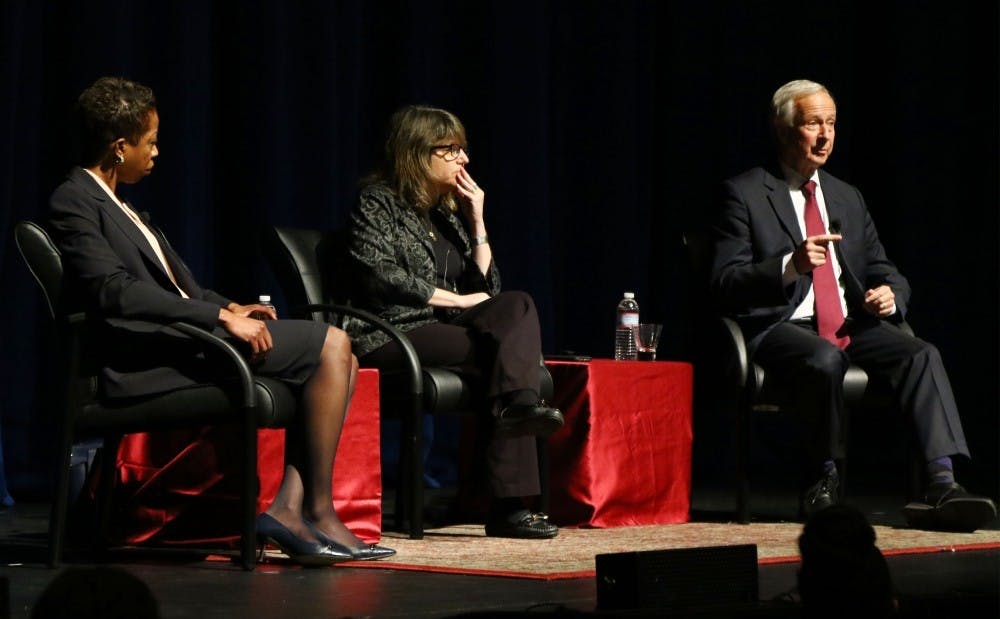President Richard Brodhead and Provost Sally Kornbluth released a report from the Task Force on Bias and Hate issues Wednesday in an email to the Duke community.
The task force has been reviewing Duke’s policies and culture since November 2015 to examine issues of bias and hate on campus. Led by Kelly Brownell, dean of the Sanford School of Public Policy, and Linda Burton, James B. Duke professor of sociology, the task force included 29 faculty, administrators, alumni and graduate and undergraduate students.
“Their recommendations will guide us as we seek to ensure that the Duke community lives up to its values of inclusion and respect for all of its members,” Brodhead wrote in the email.
Members of the task force conducted a listening tour and collected data from senior surveys based on the Everyday Discrimination Scale, which assesses perceived discrimination by individuals. The survey asked students to rank statements such as, “people act as if they are afraid of you” or “you are threatened or harassed,” based on frequency of occurrence—“almost every day,” “at least once a week,” “a few times a month,” “a few times a year,” “less than once a year” or “never.”
The task force also reviewed the written documents of student demands from various identity groups. Based on the findings of six working groups created by the task force, members established recommendations and wrote the report.
"It’s a long complicated report," Brodhead said. "It needs to be read carefully and needs to be thought of as a whole and along with things we are already doing."
The report includes 11 central recommendations, including the establishment of a campus-wide policy for handling complaints of hate and bias, putting the central authority of carrying out policies with the Office of the Provost and having university officials review student support services to ensure that the staff is diverse and trained to handle bias and hate issues.
Brodhead explained that the idea for a policy to handle complaints of hate and bias is likely modeled after the current campus-wide policy regarding sexual assault and that he plans to consider this recommendation, along with the others listed in the report.
The task force also recommended that Brodhead and Kornbluth establish a standing committee—consisting of undergraduate, graduate and professional students along with faculty, staff and alumni—to advise them and to enhance community trust. The committee will release an action plan by the end of Fall 2016. Establishing programs and curricula to educate members of the Duke community on issues of hate and bias is also recommended.
In addition, the report suggests that the Duke community “recognize the unacceptable prevalence of hate and bias experiences on campus, take responsibility for change and acknowledge the powerful negative effects on individuals these experiences can have."
Members of the task force noted that they were pleased with the group's final report.
Gavan Fitzsimons—head of the task force’s data subcommittee and R. David Thomas professor of marketing and psychology in the Fuqua School of Business—said that he felt the task force created recommendations that will help the University move forward.
"We felt that by pushing hard to make sure things actually happened that there were some teeth to the report," he said.
The data gathered by his committee reaffirmed that issues of hate and bias exist on campus, he explained. He said that he is optimistic that the recommendations will come to fruition within the next few years.
Anne West, associate professor of neurobiology and a member of the task force, said that the task force worked to create practical recommendations and that she thinks the establishment of a standing committee to continue the task force's work is crucial.
"There's only so much that 29 people can do," she said. "We needed to have a quick response, but [the task force] is no solution to the larger problem."
Brodhead noted that despite his plans to step down at the end of the 2016-17 academic year, he will work on implementing the recommendations with help from a follow-up group that will be created to advise the administration on implementation.
"I intend to use the office of the presidency to the fullest until my last day in office," he said. "The community is in a state of readiness and commitment to work on these issues, so let's do it now."
The idea for the task force came after the first community forum November 13, during which students voiced concerns about the campus climate. Brodhead responded to these grievances by stating that a task force would be created to strengthen existing efforts to combat bias and would be modeled after the University's Gender Violence Task Force.
During weekly meetings throughout the course of three months beginning Jan. 21, the task force attempted to solve central issues by identifying what hate and bias look like and specifically how they are experienced in everyday student life.
Get The Chronicle straight to your inbox
Sign up for our weekly newsletter. Cancel at any time.
The task force co-chairs presented their key guiding questions, the internal structure of the task force and a list of faculty and student members to the Academic Council in February.
The task force concentrated on evaluating whether current university practices on issues of bias and hate were adequate, determining whether there should be a policy that prohibits or punishes certain expressions of bias or hate, determining how to aid students who have experienced bias or hate incidents and deciding upon what actions can be taken to prevent bias and hate incidents.
Brodhead noted that he hopes the report will be widely read by all members of the Duke community.
The full report can be viewed here:
Final Report From Task Force on Hate and Bias Issues by thedukechronicle
This story was updated Thursday at 7:45 p.m. to include additional information about the task force and quotes from President Brodhead, Gavan Fitzsimons and Anne West.

